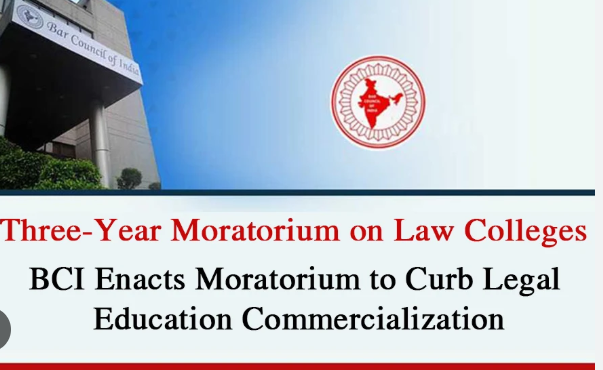
The Bar Council of India (BCI) has imposed a three-year moratorium (from August 2025) on the approval and establishment of new law colleges across India. This move is considered one of the most sweeping regulatory steps in recent years to address mounting concerns over the falling quality of legal education in the country.
Background and Rationale
The BCI, through a press release dated August 13, 2025, emphasized that this decision was necessary to curb the unchecked mushrooming of substandard institutions. Key reasons for the moratorium include:
-
The proliferation of substandard law colleges due to routine issuance of No Objection Certificates (NOCs) by State Governments.
-
Affiliations being granted by universities without adequate inspection.
-
A growing trend of commercialization of legal education.
-
Widespread academic malpractice.
-
Persistent shortages of qualified teaching faculty.
-
A steep and visible decline in the quality of legal education.
The BCI asserted that India already has an adequate number of law colleges and the priority must now shift from increasing quantity to enhancing the quality of legal education.
Core Provisions of the Moratorium
1. Ban on New Law Colleges
-
No new law college or Center of Legal Education will be granted establishment or approval for the next three years nationwide.
-
Universities, State Governments, Central Government entities, and other institutions have been strongly advised not to forward any new proposals during this period.
2. Restrictions on Existing Colleges
-
Existing Centers of Legal Education are not permitted to introduce new sections, courses, or batches without prior, written approval from the BCI.
-
Any such proposals will undergo “strict scrutiny and ongoing compliance reviews.”
3. Processing of Pending Applications
-
Applications for establishment received prior to the moratorium which have not received final BCI approval will still be processed according to the law; only future proposals are blocked.
Enforcement and Inspections
-
During these three years, the BCI will step up inspections of all existing law colleges to ensure quality standards are maintained.
-
The Council has the power to close or derecognize any law college that fails to maintain prescribed standards.
Consequences for Violations
-
Any violations can result in:
-
Withdrawal of BCI approval/recognition.
-
Derecognition of degrees issued by violating colleges, rendering them invalid.
-
Ineligibility of students from such colleges for enrollment as advocates.
-
Initiation of disciplinary, civil, or criminal proceedings against institutions or authorities flouting the moratorium.
-
Exemptions: Ensuring Equality and Access
To ensure that equity and justice are not compromised, the BCI has included specific exemptions:
-
Colleges dedicated exclusively to socially and educationally backward classes, Scheduled Castes, Scheduled Tribes, or the Economically Weaker Sections (EWS).
-
Colleges proposed in remote, tribal, or aspirational districts.
-
Courses designed exclusively for persons with disabilities.
-
Proposals from state or central universities established by statute, or those specifically recommended by the relevant ministries.
However, all such proposals must still:
-
Have valid No Objection Certificates.
-
Secure prior university affiliation.
-
Demonstrate adequate infrastructure and faculty strength.
-
Prove the actual need for their establishment under the BCI’s Rules of Legal Education.
Conclusion
The moratorium is a decisive regulatory effort that reflects the BCI’s serious concern over the rapid deterioration of legal education standards caused by unchecked expansion. The focus has shifted to quality control rather than numeric growth. At the same time, to safeguard social justice and accessibility, the BCI has included clear-cut exemptions for disadvantaged and underserved groups, as well as for remote or marginalized populations.
Stakeholders—including students, universities, and prospective law college sponsors—are expected to cooperate fully with the BCI to uphold the objectives of this regulation and ensure that legal education in India attains a higher standard in the coming years.